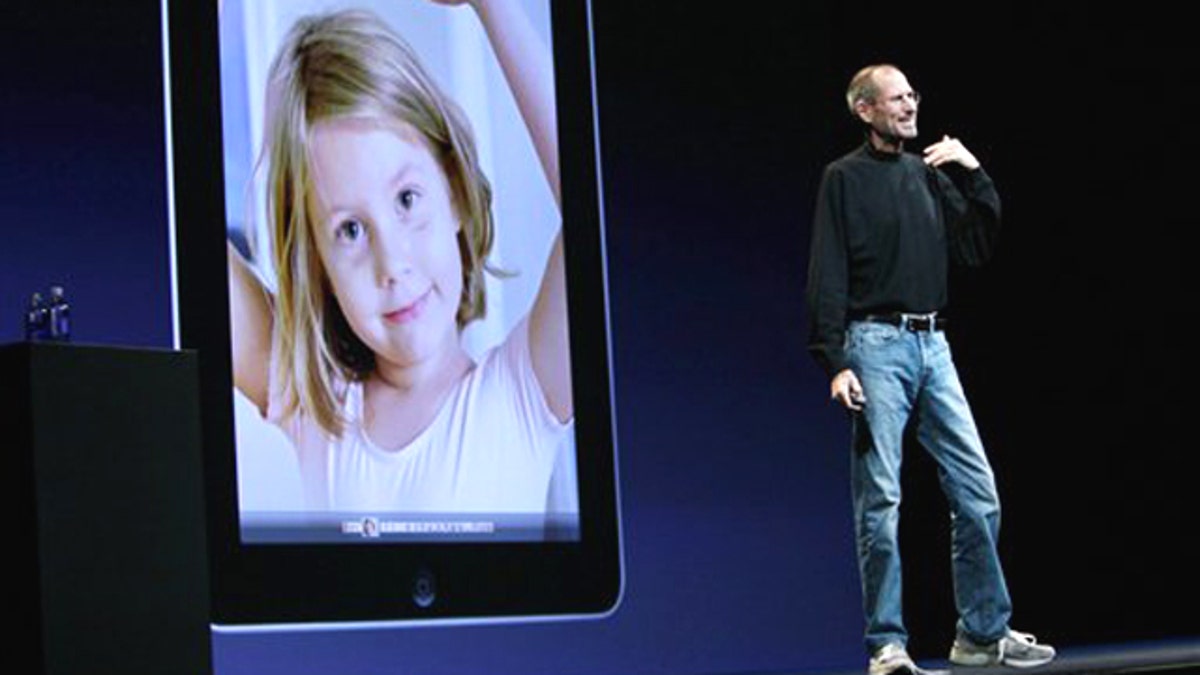
Apple CEO Steve Jobs, with the Apple iPad displayed over his shoulder, delivers the keynote address during the Apple Worldwide Developers Conference, Monday, June 7, 2010, in San Francisco. (AP Photo/Paul Sakuma)
Its tablet computer can't play most of the videos on the Web ... its cell phone has trouble making voice calls ... and yet its products are wildly popular, selling millions worldwide and engendering a cultish devotion among followers.
Apple is the new religion, say several academics. It's not a matter of rationality, it's a matter of faith.
In a research paper published this month by two professors at Texas A&M University, the authors argue that the only way to understand the slavish adoration and over-the top financial success of Apple and its "Jesus Phone" (the iPhone) is to understand its minimalist, white-walled stores as the new churches of the tech generation.
"The religious-like behavior and language surrounding Apple devotion/fandom is an example of 'implicit religion,'" Prof. Heidi Campbell, one of the authors of the study, told FoxNews.com. Implicit religion can happen when the use of, say, technology becomes a substitute for belief and behaviors once attached to religion and religious practice, she said.
That, according to the authors, explains why fans still believe when the leader of the Church of Apple, Steve Jobs, blames consumers for the poor reception of the company's cell phone (clearly, users are holding their phones incorrectly). In fact, they flock to buy the device despite its serious design flaws.
Even the pope has fretted about this new religion.
In his 2006 Christmas address, Pope Benedict XVI rhetorically asked if a savior was still needed in the modern wired world. The response from prominent technology blog Gizmodo: "Hopefully, our shepherd, Steve Jobs, will unveil Apple-Cellphone-Thingy, the true Jesus Phone ... It shall lift the hunger and disease you speak of from the land..."
The post was meant to be tongue-in-cheek, but it also revealed the rapture with which many Apple fans follow the company and its products.
University researchers note that Apple's history has elements that reflect basic elements of more traditional religions:
-- Apple's creation story epitomizes the humble garage origin of its technology -- not unlike the humble manger of Jesus' birth.
-- Apple CEO Steve Jobs is perceived as a messianic leader who was fired but rose again to save the company.
-- Apple has traditionally had an evil archenemy, the Devil, as represented first by Microsoft and now by Google.
So if they wanted to, could Apple devotees actually create an official Apple religion? After all, many believe in the power of the iPhone and millions of consumers would buy any product the company introduces, flaws and all.
There doesn't seem to be an associated belief in a supernatural power connected to Apple, but that doesn't matter: To establish a religion, such a belief is not necessary -- at least, legally speaking in the U.S.
The Church of the SubGenius enjoys religious status in the U.S. under the First Amendment, for example. Its 10,000 reported followers believe primarily in the power of "slack," the sense of freedom that comes by achieving personal goals.
Indeed, it would be interesting if Apple were to apply for such a status in the future. Just think of the tax implications.
Follow John R. Quain on Twitter @jqontech or find more tech coverage at J-Q.com.
